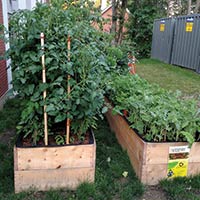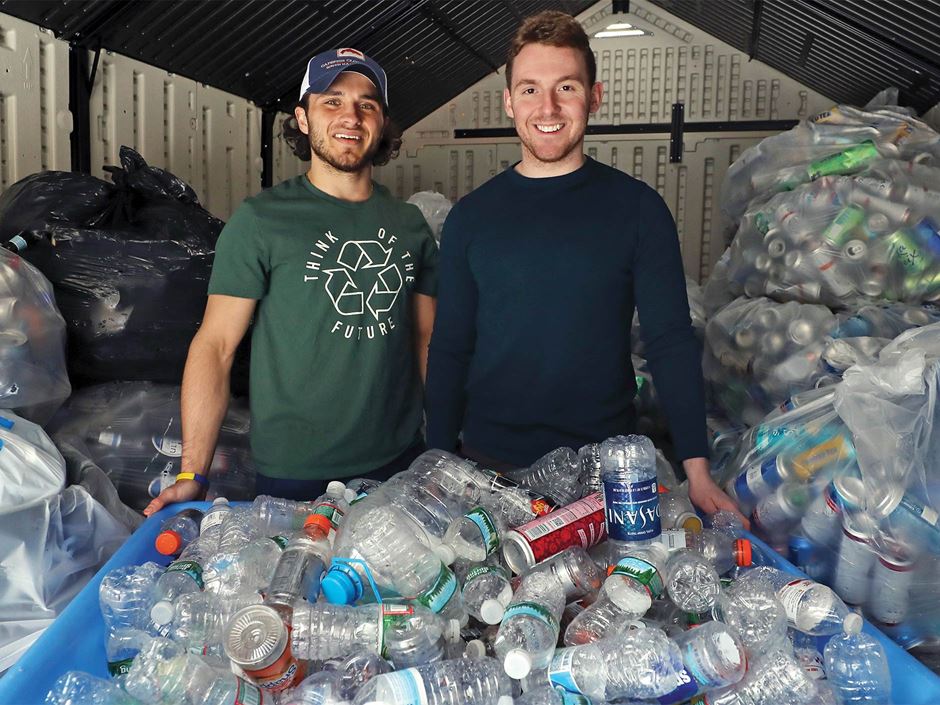As Endicott College continues to advance as an institution, we’re taking sustainability action to ensure our growth can create positive change. Endicott fosters a healthy and sustainable community that confronts the challenges of climate change and sustainability head-on with innovative solutions that impact our campus and beyond.
 The campus garden is an example
The campus garden is an example
of sustainability at Endicott.
Some of our recent sustainability initiatives are featured in the new Samuel C. Wax Academic Center, where we introduced healthier and chemical-free furniture as well as an energy efficient heating and cooling system that received a grant of over $100,000 through the Massachusetts Clean Energy Center (MassCEC). Green building highlights also include all-LED lighting and controls, water bottle filling stations, low-flow water fixtures, standardized waste/recycling bins, and universal signage that will be incorporated across campus, and centralized business hubs for printing. This is the first location where we are piloting furniture that complies with the Healthier Hospitals Healthier Interiors guidelines that reduce unnecessary chemicals added to furniture such as flame retardants, perfluorinated compounds, formaldehyde, polyvinyl chloride (PVC), and antimicrobials. Healthier materials will improve indoor air quality and our community’s health.
Anthony Michetti, director of sustainability at Endicott, explains, “By addressing added chemicals of concern in the materials found in our buildings, we are able to partner with procurement and our vendors to help shift the overall market. Larger players such as Google, Kaiser Permanente, and Harvard University have taken the lead on this, but it is meaningful for an institution our size to contribute. The sustainability features that are part of the new building will help reduce our greenhouse gas emissions to combat climate change while addressing the health of our students, faculty, and staff. We are also piloting healthier materials in several other locations including the Ginger Judge Science Center expansion.”
Sustainability Program Updates
- Curtis L. Gerrish School of Business & Ginger Judge Science Center has been retrofitted to all LED lighting, moving us closer to being a 100 percent LED campus.
- Piloting an energy manager database to track energy and water use in all of our buildings on campus.
- Drafting the College’s first Sustainability Plan that will set strategic, measurable, and achievable goals.
- Three student fellows will return for another academic year.
- Hosted the Patterson Rockwood Professor of Energy at Harvard University, Daniel G. Nocera, as part of the STEM Lecture Series. He is globally recognized as a leader in renewable energy research and invented the artificial leaf and bionic leaf.
- Annual Sustainability Week takes place each November, offering events on campus daily.
- Harvested garlic and other produce from campus garden that will be used by Sodexo.
- More bottle filling stations installed across campus buildings, including residence halls.
- Partnering with the City of Beverly to pursue a bike sharing program and participating in their Municipal Vulnerability and Preparedness (MVP) program; presented at the City’s MVP Community Workshop on the College’s sustainability initiatives and programs.
- Launched a sustainability E-newsletter.
Sustainability by the Numbers
- On-campus solar provides 11 percent of the College’s total electricity consumption annually
- LED lighting saves over $350,000 each year
- 6 EV charging stations with 43 hours of total monthly usage
- 3 miles of hiking trails
- 19 water bottle filling stations have helped save 848,523 plastic bottles
- Low-flow fixtures save almost 15,000 gallons of water annually
- The College diverts an average of 37 percent of its generated waste from the landfill through its recycling and compost programs weekly
- 9,425 pounds of food waste composted weekly
- Average of 350 pounds of food donated weekly to a local homeless shelter
- 120+ undergraduate courses that teach or incorporate sustainability-related themes
- Environmental science majors have completed 157 internships with nationwide organizations that focus on sustainability-related work experience
